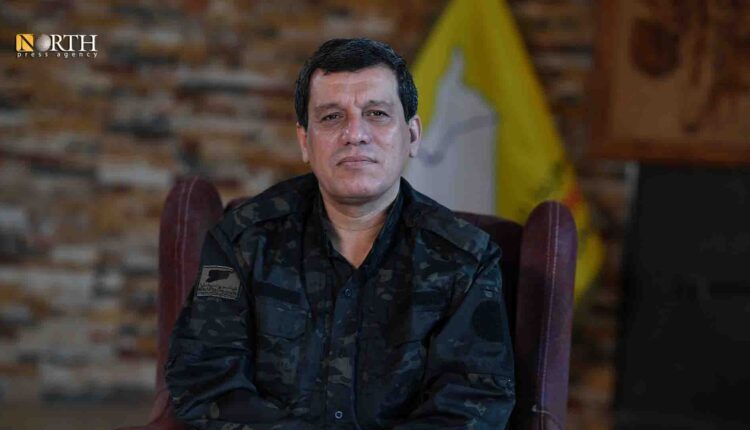SDF Commander Mazloum Abdi Welcomes Kurdish Unity Talks as “Source of Happiness”
By Kardo Roj
HASAKAH, Syria (North Press) – General Mazloum Abdi, Commander-in-Chief of the Syrian Democratic Forces (SDF), on Tuesday described the latest talks between the Kurdish National Council (ENKS) and the Democratic Union Party (PYD) as a “source of happiness,” signaling renewed efforts to unify Kurdish political factions in northeast Syria.
The meeting, held in the presence of US envoy to North and East Syria Scott Bolz, was attended by representatives from both parties, with discussions centered on reviving intra-Kurdish dialogue.
Suleiman Oso, a senior member of ENKS’s Presidential Committee, told North Press that the meeting was “very positive” and emphasized the need for continued dialogue to address long-standing political divisions.
The intra-Kurdish dialogue process, initially facilitated by US mediation in 2020, aimed to reconcile differences between ENKS, which is backed by the Kurdistan Regional Government (KRG) and has ties to the Syrian opposition, and the PYD, which leads the Autonomous Administration of North and East Syria (AANES). However, talks stalled due to political disagreements and external pressures.
General Abdi, in a statement shared on social media platform X (formerly Twitter), stressed that the renewed discussions marked “the first step in a series of meetings aimed at achieving Kurdish unity.” He reiterated the commitment of the SDF and AANES to fostering an inclusive and democratic Syria that ensures the rights of all components in the region.
The presence of US envoy Scott Bolz underscores Washington’s continued engagement in northeast Syria, particularly in supporting stability and dialogue among Kurdish factions. The US has long viewed a united Kurdish front as crucial for ensuring regional security, particularly in countering threats from Islamic State (ISIS) sleeper cells and maintaining stability in areas liberated from extremist control.
While the US maintains military and diplomatic support for the SDF, it has also encouraged political reconciliation among Kurdish groups to strengthen governance under the AANES. The latest meeting suggests that Washington is once again pushing for a more cohesive Kurdish political structure, which could have broader implications for the region’s future.
Despite the positive tone of the talks, significant challenges remain. The relationship between ENKS and PYD has been marked by political disagreements and accusations of political repression, complicating efforts to build lasting unity. Additionally, external actors, including Turkey, have historically opposed any Kurdish political consolidation in Syria, viewing the PYD as an extension of the Kurdistan Workers’ Party (PKK), which Ankara considers a terrorist organization.
Moreover, ENKS remains affiliated with the Turkish-backed Syrian opposition, raising concerns about the durability of any agreement reached. However, Abdi’s remarks suggest that the SDF sees the ongoing talks as a strategic necessity for both Kurdish interests and broader regional stability.
If successful, Kurdish unity talks could strengthen the political legitimacy of the AANES and provide a more unified Kurdish position in future negotiations regarding Syria’s political settlement. A stronger Kurdish political alliance could also enhance the region’s ability to navigate complex international relations, particularly with the US and regional powers.
With the US signaling its continued interest in facilitating dialogue, the coming weeks could prove critical in determining whether these talks lead to a sustainable agreement or remain another fleeting attempt at reconciliation.

